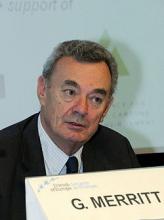Juncker’s Make-or-Break Presidency
Needless to say, it’s the big picture that really matters. The message of the European Parliament election was that the EU is losing public support at an alarming rate. For a few weeks, the focus of attention in Brussels and most European capitals was on the reforms needed to recover the trust of almost 300 million voters.
But attention soon switched to the very public row between the EU’s national leaders over whether Luxembourg’s Jean-Claude Juncker should get the Union’s top job, which is precisely the sort of issue that conveys a business-as-usual attitude – in defiance of the wave of euroskepticism expressed by votes cast throughout Europe. Indeed, Juncker was his country’s prime minister for almost two decades, and is thus a familiar face on the EU scene. He is highly qualified, but he is not exactly an exciting newcomer whose arrival would herald change.
It is possible, of course, that Juncker will confound his critics and become the radical reformer that the EU needs and public opinion wants. Let’s hope so, because the next few years look like a make-or-break period for the European project.
There will always be arguments over how much economic and political integration to pursue, but few level-headed people in Europe nowadays contest the idea of strength through unity in a world being turned upside down by globalization and the rise of new powers like China and India. Close cooperation within the EU framework is the best – and perhaps the only – way to counter Europe’s bleak outlook of slow economic growth and a shrinking population. Europe’s nation-states are no longer geopolitically viable in a world where the largest, Germany, has fewer people than one of China’s smallest provinces.
This uncomfortable truth makes the idea of the EU’s disintegration seem absurd, yet that outcome is a real threat, owing to the rising tide of euroskepticism fueled by EU institutions’ failure to connect with Europe’s voters. EU officials, including the technocrats who fill so many of the European Parliament’s seats, have been hopelessly ineffective at conveying to the public the purpose and value of their policies.
That is partly because EU institutions embody a strange combination of inertia and hyperactivity. Without any effective democratic check on the Commission’s activities, its officials persist in seeking new areas in which to extend their activities, without facing any pressure to abandon others where their involvement is outdated. The result is a widespread public perception of an EU with long tentacles that reach into almost every nook and cranny of European society.
The eurocrats in Brussels see things differently. Their view is of a Europe that is losing the global economic race. They see other countries, especially in Asia, embracing new technologies and boosting their industrial competitiveness. Only by urging the member governments to wake up to this reality and collaborate more closely, say EU policymakers, can Europe keep up with ever-tougher competition.
As always, the truth lies somewhere in between. Europe’s industries and national authorities need to get their act together and fully exploit the economies of scale that the EU offers, while the EU itself must embrace change and submit itself to severe streamlining: Reform or die.
But what needs to be reformed, how, and by whom? The main risks are that the reform process could end up discarding core EU values and functions – throwing the baby out with the bathwater – or, at the opposite extreme, that EU officialdom might limit reform to largely cosmetic changes.
There is already much discussion and disagreement among EU member states over the reform agenda, with different governments adopting predictable stances depending on their domestic politics and prejudices. As a result, they could ultimately fail to tackle the greatest challenge of all: the culture of the EU’s bureaucracy.
Whatever the eurocrats’ strengths and weaknesses, there is no denying that they have developed a unique ethos of complacency and high-handedness. The European Commission’s role as honest broker among competing national interests must be retained at all costs, but its shortcomings need to be scrutinized mercilessly.
Tied down by its own red tape, the EU does not think strategically enough. Frightened by its own waning popularity, it does not ring alarm bells loudly enough. Above all, sealed off in the Brussels bubble, its institutions and officials do not communicate well enough. Europe’s voters have conveyed their message, and Juncker had better listen.
Copyright: Project Syndicate, 2014.
www.project-syndicate.org
This article is brought to you by Project Syndicate that is a not for profit organization.
Project Syndicate brings original, engaging, and thought-provoking commentaries by esteemed leaders and thinkers from around the world to readers everywhere. By offering incisive perspectives on our changing world from those who are shaping its economics, politics, science, and culture, Project Syndicate has created an unrivalled venue for informed public debate. Please see: www.project-syndicate.org.
Should you want to support Project Syndicate you can do it by using the PayPal icon below. Your donation is paid to Project Syndicate in full after PayPal has deducted its transaction fee. Facts & Arts neither receives information about your donation nor a commission.



















